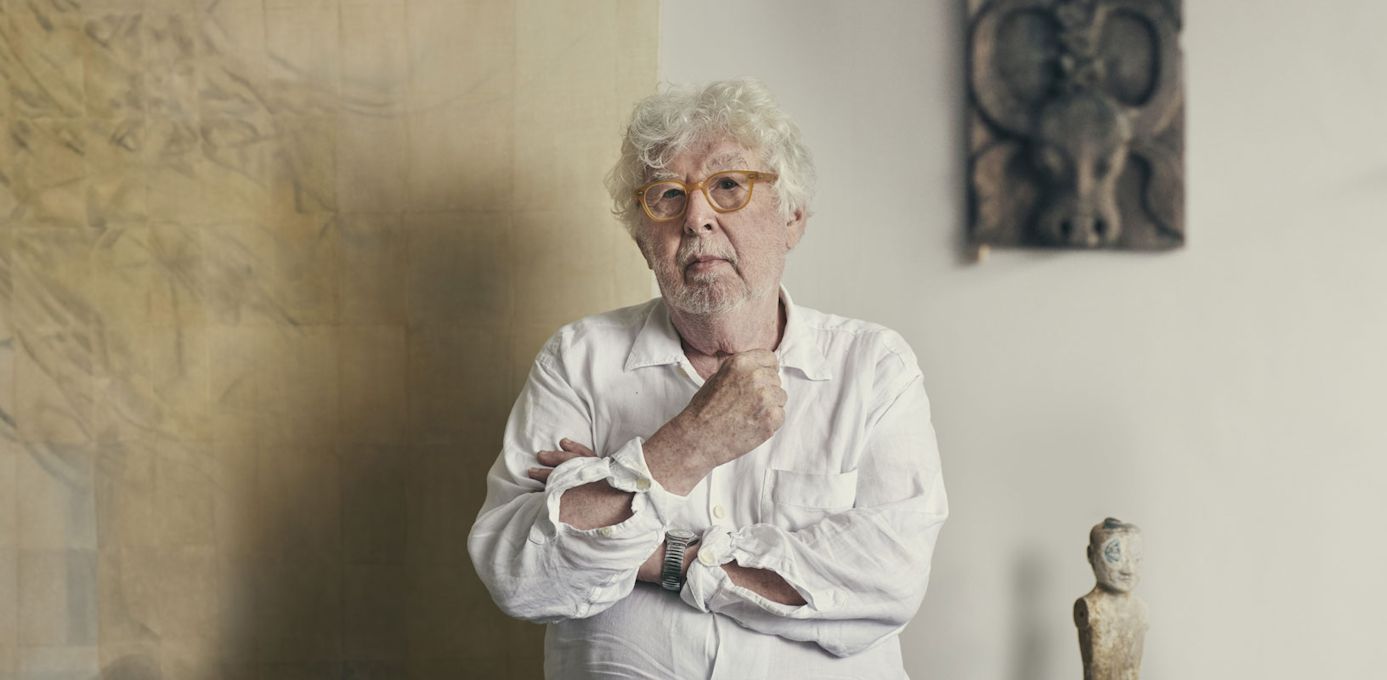

|
Sir Harrison Birtwistle was born in Accrington in the north of England
in 1934 and studied clarinet and composition at the Royal Manchester College
of Music, making contact with a highly talented group of contemporaries
including Peter Maxwell
Davies, Alexander Goehr, John Ogdon and Elgar Howarth. In 1965 he
sold his clarinets to devote all his efforts to composition, and travelled
to Princeton as a Harkness Fellow where he completed the opera Punch
and Judy. This work, together with Verses for Ensembles and
The Triumph of Time, firmly established Birtwistle as a leading
voice in British music.
The decade from 1973 to 1984 was dominated by his monumental lyric tragedy The Mask of Orpheus, staged by English National Opera in 1986, and by the series of remarkable ensemble scores now performed by the world's leading new music groups: Secret Theatre, Silbury Air and Carmen Arcadiae Mechanicae Perpetuum. Large-scale works in the following decade included the operas Gawain and The Second Mrs Kong, the concertos Endless Parade for trumpet and Antiphonies for piano, and the orchestral score Earth Dances. Birtwistle's orchestral works since 1995 include Exody, premiered
by the Chicago Symphony Orchestra and Daniel Barenboim, Panic
which received a high profile premiere at the Last Night of the 1995
BBC Proms with an estimated worldwide audience of 100 million, and The
Shadow of Night commissioned by the Cleveland Orchestra
and Christoph von Dohnányi.
The Last Supper received its first performances at the Deutsche
Staatsoper in Berlin and at Glyndebourne in 2000. Pulse Shadows,
a meditation for soprano, string quartet and chamber ensemble on poetry
by Paul Celan, was released on disc by Teldec and won the 2002 Gramophone
Award for best contemporary recording. Theseus Game, co-commissioned
by RUHRtriennale, Ensemble Modern and the London Sinfonietta, was premiered
in 2003. The following year brought first performances of The Io
Passion for Aldeburgh Almeida Opera and Night's Black Bird
commissioned by Roche for the Lucerne Festival. His opera The Minotaur
received its premiere at the Royal Opera House Covent Garden in 2008 and
has been released on DVD by Opus Arte.
The music of Birtwistle continues to attract international conductors including Daniel Barenboim, Christoph von Dohnányi, Oliver Knussen, Sir Simon Rattle, Peter Eötvös, Franz Welser-Möst, Paul Daniel and Martyn Brabbins. He has received commissions from leading performing organisations and his music has been featured in major festivals and concert series including the BBC Proms, Salzburg Festival, Glyndebourne, Holland Festival, Lucerne Festival, Stockholm New Music, Wien Modern, Wittener Tage, the South Bank Centre in London, the Konzerthaus in Vienna, MiTo in Turin and Milan and Casa da Música in Porto. Birtwistle has received many honours, including the Grawemeyer Award in 1968 and the Siemens Prize in 1995; he was made a Chevalier de l’Ordre des Arts et des Lettres in 1986, awarded a British knighthood in 1988 and made a Companion of Honour in 2001. He was Henry Purcell Professor of Music at King's College, University of London (1995-2001) and is currently a Visiting Professor at the Royal Academy of Music in London. Recordings of Birtwistle's music are available on the Decca, Philips, Deutsche Grammophon, Teldec, Black Box, NMC, CPO, Metronome and Soundcircus labels. Harrison Birtwistle is published by Boosey & Hawkes. December 2017. Reprinted by kind
permission of Boosey & Hawkes [Text only - photos from other sources]
|
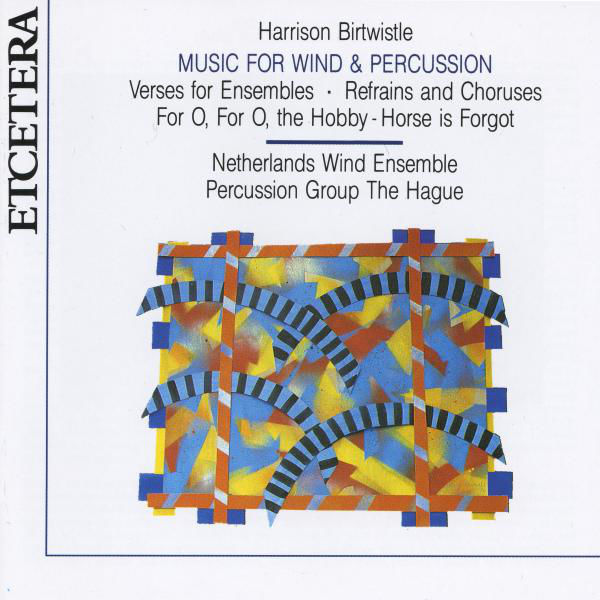 Sir HB: I have a fairly sort of funny life
in my working arrangements. For instance, I haven’t done any
work for about eight months, but then previous to that, I’d worked every
day for three years. I’m not a person of habit or pattern.
Sir HB: I have a fairly sort of funny life
in my working arrangements. For instance, I haven’t done any
work for about eight months, but then previous to that, I’d worked every
day for three years. I’m not a person of habit or pattern.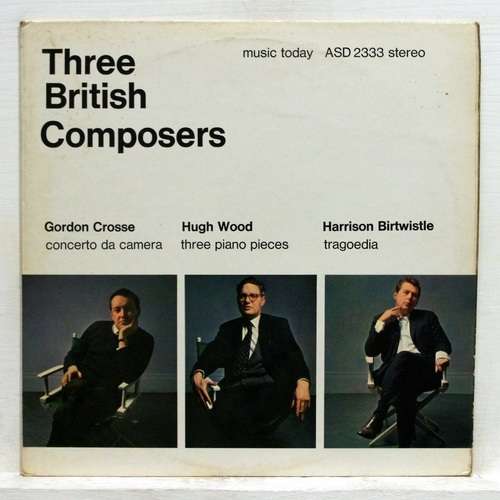 Sir HB: I don’t know. The history of English music is
strange.
Sir HB: I don’t know. The history of English music is
strange.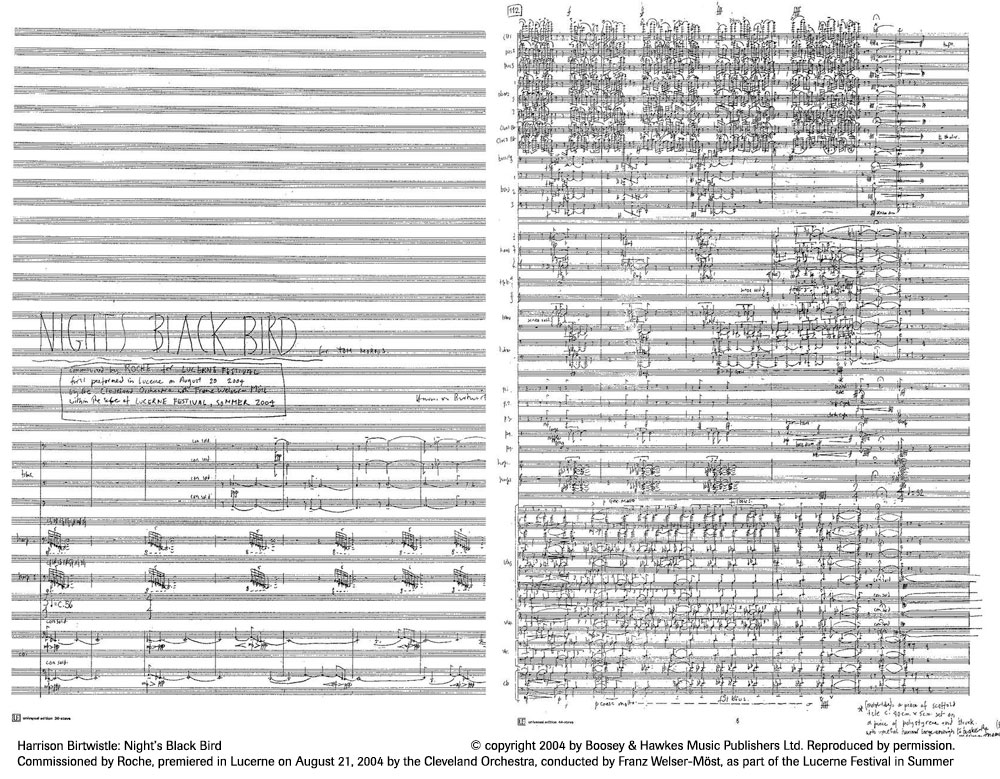
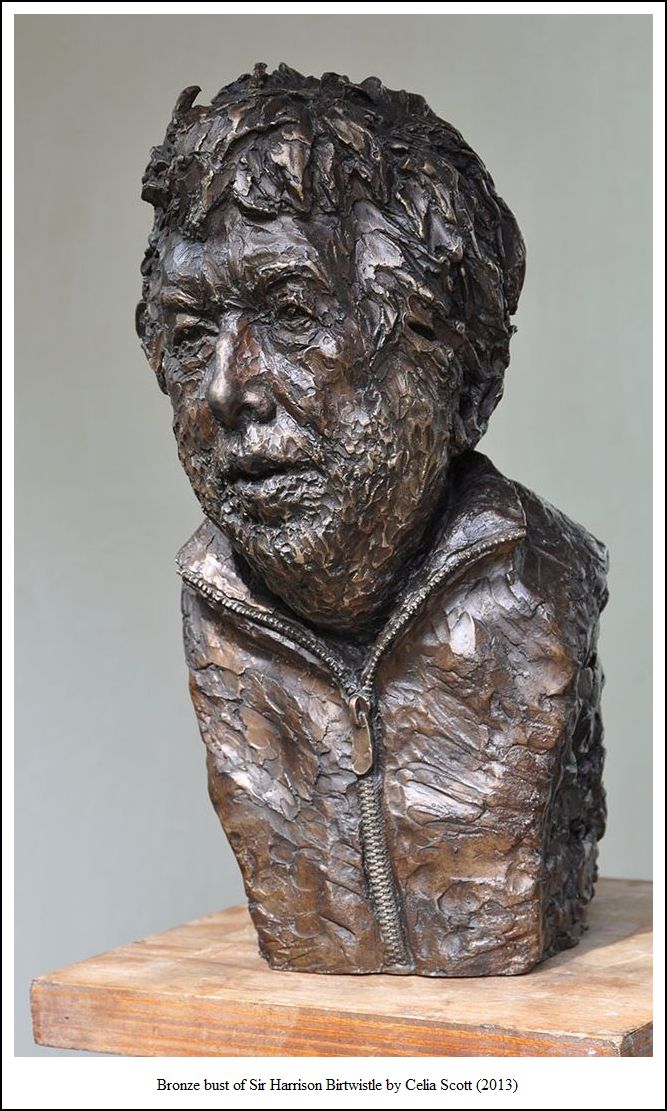 Sir HB: Interpretation is a funny thing,
especially for the great performers. I listened to Alfred Brendel playing
Beethoven the other day, and one thing about that was that it sounds
like Beethoven’s Beethoven, not Brendel’s Beethoven. It’s the sort
of performing that I really admire. Very often when we talk about
interpretation, you hear somebody’s version of the composer’s music,
and that is not the sort of thing that interests me. It becomes
a vehicle for them, rather than them being a vehicle for the music, and
it becomes, then, a version of what it is.
Sir HB: Interpretation is a funny thing,
especially for the great performers. I listened to Alfred Brendel playing
Beethoven the other day, and one thing about that was that it sounds
like Beethoven’s Beethoven, not Brendel’s Beethoven. It’s the sort
of performing that I really admire. Very often when we talk about
interpretation, you hear somebody’s version of the composer’s music,
and that is not the sort of thing that interests me. It becomes
a vehicle for them, rather than them being a vehicle for the music, and
it becomes, then, a version of what it is.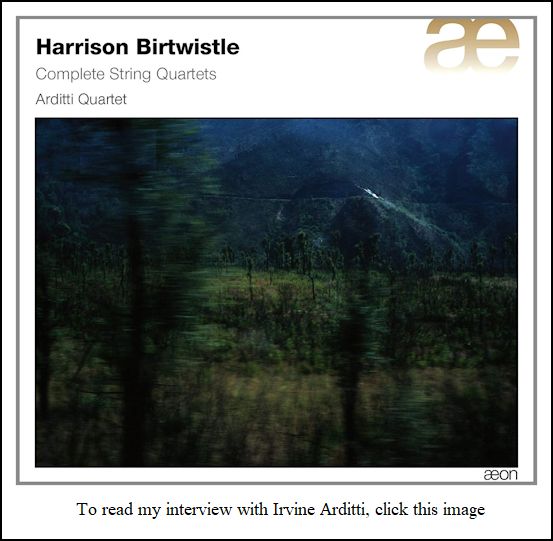 Sir HB: [Thinks a moment, then remarks on the pause] Long
silence! [Continues his silent consideration, then verbalizes his
thoughts] For one thing, it’s unique, isn’t it? It expresses
things that you can’t express in any other way. I don’t know, maybe
it doesn’t have any purpose. Whatever purpose it has, it is in great
danger of being devalued in the way that sound is treated. It becomes
like the wallpaper to our lives. It’s on in restaurants. It’s
on wherever you turn, and has nothing to do with the quality of it, but
just the idea that there is some sort of music going on. You pick
up the telephone, there’s something. If you go through the airwaves,
it’s like garbage — it’s all up there, and
consequently there’s a result that music simply becomes wallpaper, and we
don’t listen to it. It’s something that we have on, and if you make
a complaint — for instance, in a restaurant
or something — they say that everybody
demands it. But people don’t demand it! However, as soon as
you turn it off, then they want it, but they didn’t even know it was on
in the first place. Consequently, look what happens if you write a
piece of music which is, to some extent, against that; a piece of music
like mine that they’re playing here in Chicago, which demands a concentration.
It’s to do with the drama, or having a beginning and an end.
It’s to do with many things, and people can’t accept it on that level. It
would be very easy to write the sort of music which would simply replace
that satiation in the way that we listen to classical music
— whether we really do, or perhaps we just become
familiar with it. Do we ever question whether a piece of music is
a good piece? I remember being in Cleveland where they were also
playing the Dvořák Cello Concerto. I was talking to
them about my piece, and I mentioned this point, and asked if they questioned
the fact that as to whether the Dvořák Cello Concerto is
a great piece of music. This was sort of arrogance, and I said,
“Consider the ending. I think that it’s an
absolute cop-out! Is this the right ending for the
piece, or could it have been something else?”
I happen to think it’s a cop-out, and it doesn’t work. What was
happening there was that nobody had ever considered that maybe Dvořák
was capable of doing anything wrong.
Sir HB: [Thinks a moment, then remarks on the pause] Long
silence! [Continues his silent consideration, then verbalizes his
thoughts] For one thing, it’s unique, isn’t it? It expresses
things that you can’t express in any other way. I don’t know, maybe
it doesn’t have any purpose. Whatever purpose it has, it is in great
danger of being devalued in the way that sound is treated. It becomes
like the wallpaper to our lives. It’s on in restaurants. It’s
on wherever you turn, and has nothing to do with the quality of it, but
just the idea that there is some sort of music going on. You pick
up the telephone, there’s something. If you go through the airwaves,
it’s like garbage — it’s all up there, and
consequently there’s a result that music simply becomes wallpaper, and we
don’t listen to it. It’s something that we have on, and if you make
a complaint — for instance, in a restaurant
or something — they say that everybody
demands it. But people don’t demand it! However, as soon as
you turn it off, then they want it, but they didn’t even know it was on
in the first place. Consequently, look what happens if you write a
piece of music which is, to some extent, against that; a piece of music
like mine that they’re playing here in Chicago, which demands a concentration.
It’s to do with the drama, or having a beginning and an end.
It’s to do with many things, and people can’t accept it on that level. It
would be very easy to write the sort of music which would simply replace
that satiation in the way that we listen to classical music
— whether we really do, or perhaps we just become
familiar with it. Do we ever question whether a piece of music is
a good piece? I remember being in Cleveland where they were also
playing the Dvořák Cello Concerto. I was talking to
them about my piece, and I mentioned this point, and asked if they questioned
the fact that as to whether the Dvořák Cello Concerto is
a great piece of music. This was sort of arrogance, and I said,
“Consider the ending. I think that it’s an
absolute cop-out! Is this the right ending for the
piece, or could it have been something else?”
I happen to think it’s a cop-out, and it doesn’t work. What was
happening there was that nobody had ever considered that maybe Dvořák
was capable of doing anything wrong.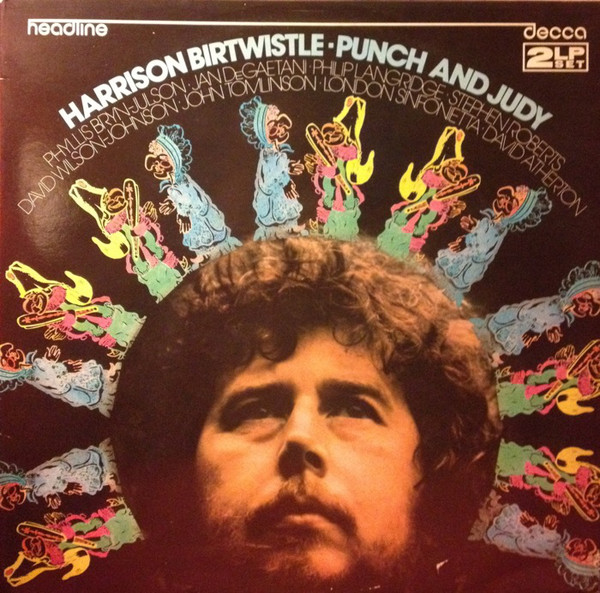 Sir HB: Yes, of course.
Sir HB: Yes, of course.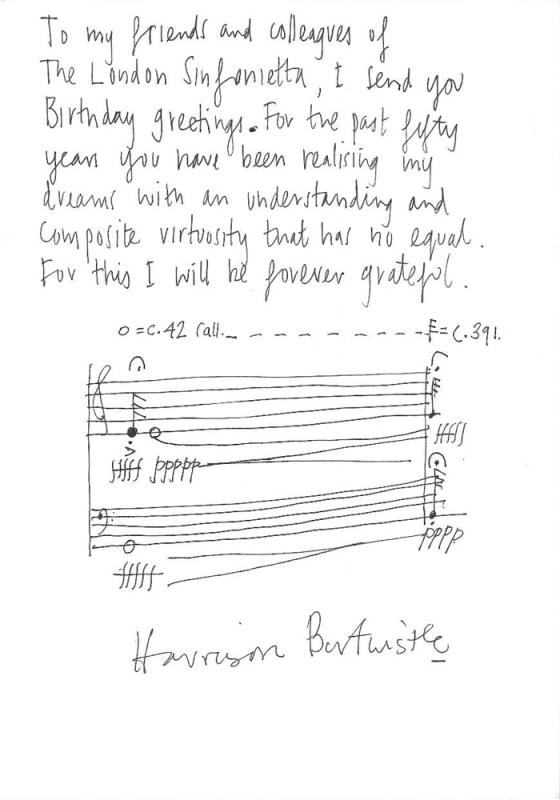 BD: Usually composers find to make snips here and there.
BD: Usually composers find to make snips here and there.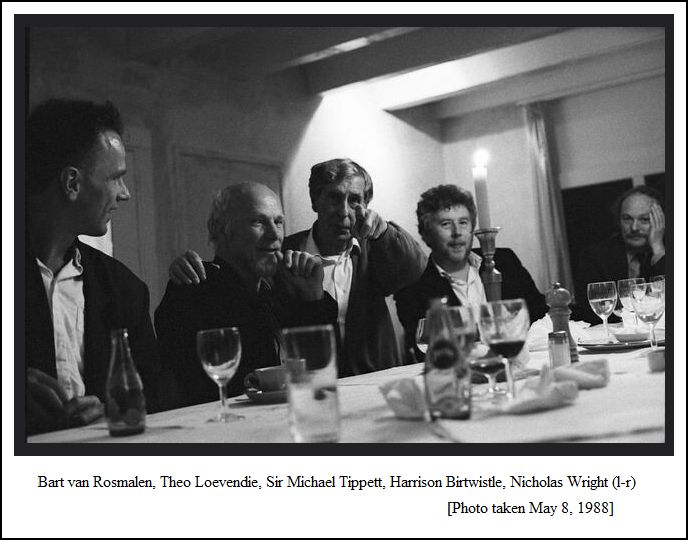 BD: Why?
BD: Why?
© 1996 Bruce Duffie
This conversation was recorded in Chicago on December 8, 1996. Portions were broadcast on WNIB in 1998 and 1999. This transcription was made in 2019, and posted on this website at that time. My thanks to British soprano Una Barry for her help in preparing this website presentation.
To see a full list (with links) of interviews which have been transcribed and posted on this website, click here.
Award - winning broadcaster Bruce Duffie was with WNIB, Classical 97 in Chicago from 1975 until its final moment as a classical station in February of 2001. His interviews have also appeared in various magazines and journals since 1980, and he now continues his broadcast series on WNUR-FM.
You are invited to visit his website for more information about his work, including selected transcripts of other interviews, plus a full list of his guests. He would also like to call your attention to the photos and information about his grandfather, who was a pioneer in the automotive field more than a century ago. You may also send him E-Mail with comments, questions and suggestions.